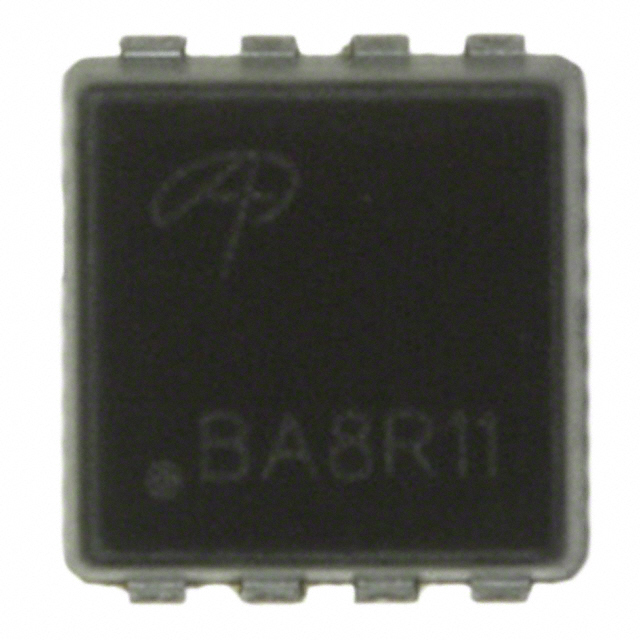AON6406
30V N-Channel MOSFET
General Description
Product Summary
VDS
• Latest Trench Power LV technology
• Very Low RDS(on) at 4.5VGS
• Low Gate Charge
• High Current Capability
• RoHS and Halogen-Free Compliant
30V
170A
ID (at VGS=10V)
RDS(ON) (at VGS=10V)
< 2.3mΩ
RDS(ON) (at VGS=4.5V)
< 3.5mΩ
ESD protected
100% UIS Tested
100% Rg Tested
Application
• DC/DC Converters in Computing, Servers, and POL
• Isolated DC/DC Converters in Telecom and Industrial
D
DFN5X6
Top View
Top View
Bottom View
1
8
2
7
3
6
4
5
Pin 1
PIN1
S
Absolute Maximum Ratings TA=25°C unless otherwise noted
Parameter
Symbol
VDS
Drain-Source Voltage
Gate-Source Voltage
Continuous Drain
CurrentG
VGS
TC=25°C
TA=25°C
Units
V
±20
V
A
110
IDM
280
25
IDSM
TA=70°C
Maximum
30
170
ID
TC=100°C
Pulsed Drain Current C
Continuous Drain
Current
G
A
19
Avalanche Current C
IAS
60
A
Avalanche energy L=0.1mH C
TC=25°C
EAS
180
mJ
Power Dissipation B
TA=25°C
Power Dissipation A
Junction and Storage Temperature Range
Rev 1.0: October 2014
2.3
Steady-State
Steady-State
RθJA
RθJC
www.aosmd.com
W
1.4
TJ, TSTG
Symbol
t ≤ 10s
W
45
PDSM
TA=70°C
Thermal Characteristics
Parameter
Maximum Junction-to-Ambient A
Maximum Junction-to-Ambient A D
Maximum Junction-to-Case
110
PD
TC=100°C
-55 to 150
Typ
14
40
0.85
°C
Max
17
55
1.1
Units
°C/W
°C/W
°C/W
Page 1 of 6
�Electrical Characteristics (TJ=25°C unless otherwise noted)
Parameter
Symbol
STATIC PARAMETERS
BVDSS
Drain-Source Breakdown Voltage
Conditions
ID=250µA, VGS=0V
Min
Typ
30
36
VDS=30V, VGS=0V
IDSS
Zero Gate Voltage Drain Current
IGSS
VGS(th)
Gate-Body leakage current
VDS=0V, VGS= ±16V
Gate Threshold Voltage
VDS=VGS ID=250µA
TJ=55°C
5
1.3
10
uA
2.4
V
1.9
2.3
2.8
3.4
3.5
mΩ
1
V
170
A
5200
pF
Static Drain-Source On-Resistance
VGS=4.5V, ID=20A
2.4
gFS
Forward Transconductance
VDS=5V, ID=20A
130
VSD
Diode Forward Voltage
IS=1A,VGS=0V
0.67
IS
Maximum Body-Diode Continuous CurrentG
DYNAMIC PARAMETERS
Ciss
Input Capacitance
Output Capacitance
Crss
Reverse Transfer Capacitance
Rg
Gate resistance
4300
VGS=0V, VDS=15V, f=1MHz
µA
1.8
RDS(ON)
TJ=125°C
Units
V
1
VGS=10V, ID=20A
Coss
Max
mΩ
S
720
pF
420
pF
2
3
Ω
SWITCHING PARAMETERS
Qg(10V) Total Gate Charge
70
100
nC
Qg(4.5V) Total Gate Charge
33
nC
10
nC
VGS=0V, VDS=0V, f=1MHz
VGS=10V, VDS=15V, ID=20A
1
Qgs
Gate Source Charge
Qgd
Gate Drain Charge
15
nC
tD(on)
Turn-On DelayTime
10
ns
tr
Turn-On Rise Time
tD(off)
Turn-Off DelayTime
tf
trr
Turn-Off Fall Time
IF=20A, dI/dt=500A/µs
Qrr
µ
Body Diode Reverse Recovery Charge IF=20A, dI/dt=500A/µs
15
Body Diode Reverse Recovery Time
VGS=10V, VDS=15V, RL=0.75Ω,
RGEN=3Ω
6.5
ns
75
ns
18
ns
30
ns
nC
A. The value of RθJA is measured with the device mounted on 1in2 FR-4 board with 2oz. Copper, in a still air environment with TA =25°C. The
Power dissipation PDSM is based on R θJA and the maximum allowed junction temperature of 150°C. The value in any given application depends
on the user's specific board design, and the maximum temperature of 150°C may be used if the PCB allows it.
B. The power dissipation PD is based on TJ(MAX)=150°C, using junction-to-case thermal resistance, and is more useful in setting the upper
dissipation limit for cases where additional heatsinking is used.
C. Repetitive rating, pulse width limited by junction temperature TJ(MAX)=150°C. Ratings are based on low frequency and duty cycles to keep initial
TJ =25°C.
D. The RθJA is the sum of the thermal impedence from junction to case RθJC and case to ambient.
E. The static characteristics in Figures 1 to 6 are obtained using
很抱歉,暂时无法提供与“AON6406”相匹配的价格&库存,您可以联系我们找货
免费人工找货